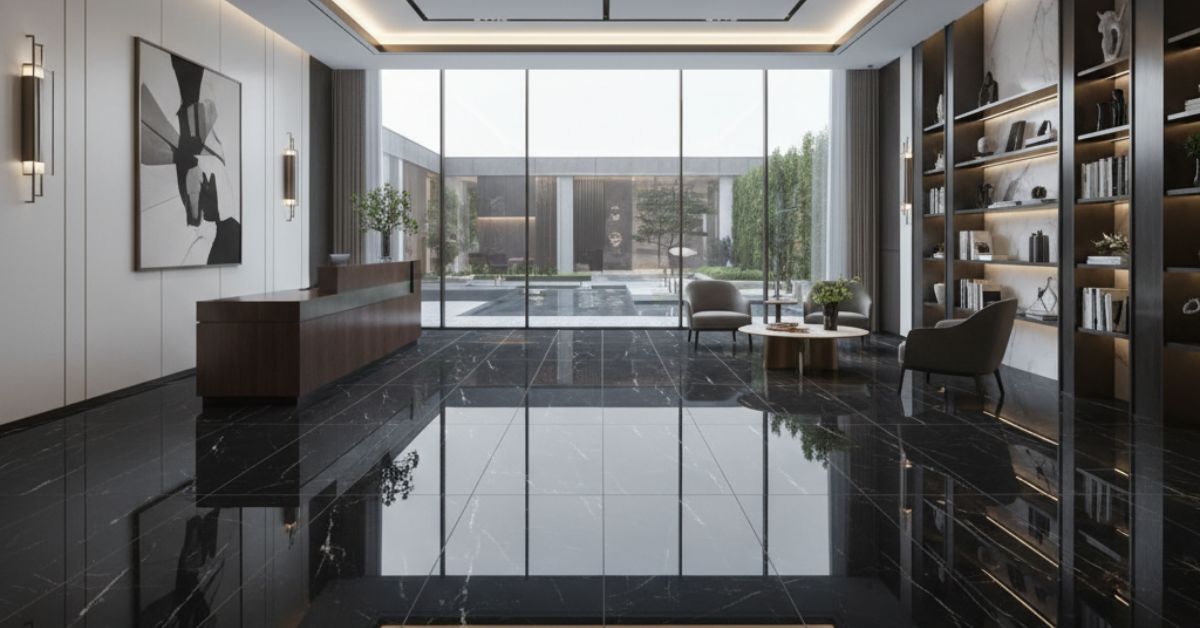Black porcelain tiles combine durability with design appeal. The dark tone adds depth, elegance, and contrast, while the porcelain body ensures low water absorption and high resistance to scratches and stains. This makes them one of the most reliable tile options for both indoor and outdoor use.
Available in glossy, matte, and textured finishes, black porcelain tiles suit bathrooms, kitchens, floors, and patios alike. Large-format sizes deliver a modern, seamless look, while smaller patterns bring character and style. This guide explores their specs, best uses, costs, and design ideas.
What Is Black Porcelain Tile?
Porcelain is a ceramic fired at high heat, which makes it dense and tough. Black porcelain tiles are popular because they last long and come in many finishes and sizes.
Manufacturing and Body
Black porcelain can be through-body or glazed. Through-body tiles keep the same colour inside and out, so chips are less visible. Glazed tiles have a coated surface that gives shine or texture. Many tiles also have rectified edges, which create tight, clean joints.
Specs Overview
-
Water absorption: ≤0.5%, so safe for wet areas.
-
Wear rating (PEI): 4–5, strong enough for busy floors.
-
Hardness (MOHS): 7–8, scratch resistant.
-
Thickness: 8–12 mm.
-
Sizes: From 300×600 mm to large slabs like 600×1200 mm.
Best Use Cases
Bathrooms and Showers
Black porcelain tiles add a bold touch to bathrooms. Matte or textured finishes prevent slips on floors. Small mosaics work well in showers for grip. On walls, glossy finishes reflect light and give a clean look.
Kitchens and Backsplashes
In kitchens, black porcelain stands up to heat and stains. A glossy splashback looks sharp against pale cabinets. On floors, large tiles reduce grout lines and make cleaning easy.
Floors
Busy areas like halls or living rooms benefit from porcelain floors. Large-format tiles give a seamless look. Levelling clips keep them even and reduce lippage.
Outdoor
With the right finish, black porcelain also works outdoors. Frost and rain do not damage it. A slip rating of R11 or higher keeps patios, garden paths, and pool areas safe.
Finishes and Formats
Glossy, Matte, and Textured
-
Glossy: Bright, reflective, and stylish, but needs regular wiping.
-
Matte: Softer look, hides marks, safer for floors.
-
Textured: Best for grip in wet or outdoor zones.
Large Format and Rectified
Large tiles cut down grout lines and make rooms feel open. Rectified edges give precise joints for a smooth finish.
Patterns
Porcelain tiles come in many shapes. Subway patterns suit kitchens. Hexagons give a modern edge. Herringbone layouts add movement and style.
Costs and Buying
Material Price Ranges
Black porcelain tiles usually cost £30–£80 per square metre. Glossy, textured, or large-format options may cost more.
Installation Costs
Fitting costs depend on size and layout. Large tiles need levelling clips, which raise labour charges. Small mosaics take longer to install. A level base and strong tools are essential, adding to cost if prep is needed.
Sample Testing
Always test samples at home. Place them in the room at different times of day. Warm light (2700K) makes tiles look soft. Cool light (4000K) creates a sharp, modern edge.
Maintenance and Care
Cleaning Without Streaks
Porcelain tiles are easy to clean. Warm water and a soft cloth are usually enough. For glossy tiles, a microfibre cloth prevents streaks. Matte and textured finishes hide marks better but still need regular care.
Sealing?
Most porcelain tiles do not need sealing. The dense surface keeps out stains. Some polished finishes may benefit from a light seal, but this is rare.
Porcelain vs Alternatives
Porcelain vs Ceramic
Porcelain is denser and absorbs less water than ceramic. It lasts longer in wet or busy areas. Ceramic is lighter and cheaper but less durable.
Porcelain vs Marble or Slate
Marble gives a luxury feel but needs sealing and more upkeep. Slate has natural texture but can chip. Porcelain offers a similar look with less maintenance.
Frequently Asked Questions
Are black porcelain tiles slippery?
Glossy finishes can be, but matte and textured options are safe on floors.
Do black porcelain tiles need sealing?
No, most do not. Polished ones may benefit from a light seal.
What is the best grout colour with black porcelain tiles?
Black grout hides stains, grey balances the look, and white adds contrast.
Can glossy black porcelain tiles be used on floors?
They can, but they may be slippery when wet. Matte or textured finishes are better for safety.
How can I avoid lippage with large-format porcelain?
Use levelling clips during fitting and prepare a flat base.

